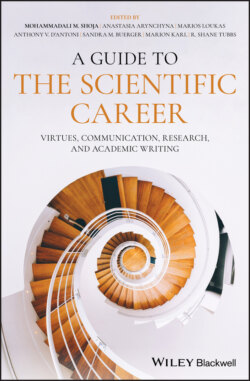Читать книгу A Guide to the Scientific Career - Группа авторов - Страница 64
References
Оглавление1 Bandura, A. (1986). Social Foundations of Thought and Action. Upper Saddle River, NJ: Prentice Hall.
2 Bandura, A. (1997). Self‐Efficacy: The Exercise of Control. New York, NY: W.H. Freeman.
3 Bandura, A. (2004). Cultivate self‐efficacy for personal and organizational effectiveness. In: Handbook of Principles of Organizational Behavior (ed. E.A. Locke), 120–136. Malden, MA: Blackwell.
4 Bandura, A. and Locke, E.A. (2003). Negative self‐efficacy and goal effects revisited. Journal of Applied Psychology 88 (1): 87–99.
5 Carney, D.R. , Cuddy, A.J.C. , and Yap, A.J. (2010). Power posing: brief nonverbal displays affect neuroendocrine levels and risk tolerance. Psychological Science 21 (10): 1363–1368.
6 Cerf, B.A. (1948). Shake Well before Using: A New Collection of Impressions and Anecdotes, Mostly Humorous. New York: Garden City Books.
7 Clance, P.R. and Imes, S.A. (1978). The impostor phenomenon in high achieving women: dynamics and therapeutic intervention. Psychotherapy: Theory, Research and Practice 15 (3): 241–247.
8 Cuddy, Amy . “Just Because I'm Nice, Don't Assume I'm Dumb.” Breakthrough Ideas of 2009. Harvard Business Review 87, no. 2 (February 2009).
9 Cuddy, A. (2012). Your Body Language Shapes Who you Are. Edinburgh, Scotland: TEDGlobal.
10 Cuddy, A.J.C. , Glick, P. , and Beninger, A. (2011). The dynamics of warmth and competence judgments, and their outcomes in organizations. Research in Organizational Behavior 31: 73–98.
11 Cuddy, A.J.C. , M. Kohut, and J. Neffinger. “Connect, Then Lead.” Harvard Business Review 91, nos. 7/8 (July–August 2013): 54–61.
12 Darwin, C. (1871). The Descent of Man. New York: D. Appleton and Company.
13 Deats, R. (2005). Mahatma Gandhi, Nonviolent Liberator: A Biography, 108. Hyde Park: New City Press.
14 Deschene, L. “8 ways to be more confident: live the life of your dreams.” Web log post. Tiny Buddha. Web. 16 Jun. 2014.
15 Dunning, D. , Johnson, K. , Ehrlinger, J. et al. (2003). Why People Fail to Recognize their Own Incompetence, 83–87. American Psychological Society.
16 Eccles, J.S. (1987). Gender roles and women's achievement‐related decisions. Psychology of Women Quarterly 11: 135–172.
17 Edwards, R.K. , Kellner, K.R. , Sistrom, C.L. et al. (2003). Medical student self‐assessment of performance on an obstetrics and gynecology clerkship. American Journal of Obstetrics Gynecology 188 (4): 1078–1082.
18 Ehrlinger, J. and Dunning, D. (2003). How chronic self‐views influence and potentially mislead estimates of performance. Journal of Personality and Social Psychology 84: 5–17.
19 Epstein, R.M. and Hundert, E.M. (2002). Defining and assessing professional competence. JAMA 287 (2): 226–235.
20 Fiske, S.T. , Cuddy, A.J.C. , and Glick, P. (2006). Universal dimensions of social cognition: warmth and competence. Trends in Cognitive Science 11 (2): 77–83.
21 Friesen, T. (2014). Ride the Waves, vol. II, 62. Bloomington: Balboa Press.
22 Haun, D.E. , Zeringue, A. , Leach, A. et al. (2000). Assessing the competence of specimen‐processing personnel. Laboratory Medicine 31 (11): 633–637.
23 Holgate, S.A. Successful careers: a matter of confidence. 2012. Science career magazine (November 2012).
24 Jami, C. (2015). Killosophy, 80. Unknown City.
25 JoyBell C.C. Quotes. Goodreads. Web. 16 Jun. 2014.
26 Kang H. (2014) When Ignorance Begets Confidence: The Classic Dunning‐Kruger [WWW]http://typezen.com/when-ignorance-begets-confidence-the-classic-dunning-kruger/2969. [Accessed 5/9/2017]
27 Kruger, J. and Dunning, D. (1999). Unskilled and unaware if it: how difficulties in recognizing one's own incompetence lead to inflated self‐assessment. Journal of Personal Social Psychology 77: 1121–1134.
28 Kruger, J. and Dunning, D. (2009). Unskilled and unaware of it: how difficulties in recognizing one's own incompetence lead to inflated self‐assessments. Psychology 1: 30–46.
29 Merkel, J.H. and Al‐Falaij, A.W. (2003). On the Art of Business, 101. Coral Springs, FL: Llumina Press.
30 Morgan, P.J. and Cleave‐Hogg, D. (2002). Comparison between medical students' experience, confidence and competence. Medical Education 36: 534–539.
31 Roosevelt, E. (1939). This Is my Story. New York: Garden City Publishing Co.
32 Rose, M . (2017) "Being" Confidence! [WWW] Noomii Coach Directory. http://www.noomii.com/articles/7008-being-confidence. [Accessed 5/9/2017].
33 Sharma, N.P. (2013). Let's Live Again, 78. Gurgaon: Partridge Publishing.
34 Sherman, G.D. , Lee, J.J. , Cuddy, A.J.C. et al. (2012). Leadership is associated with lower levels of stress. Proceedings of the National Academy of Sciences of the United States of America 109: 17903–17907.
35 Stewart, J. , O'Halloran, C. , Barton, J.R. et al. (2000). Clarifying the concepts of confidence and competence to produce appropriate self‐evaluation measurement scales. Medical Education 34: 903–909.
